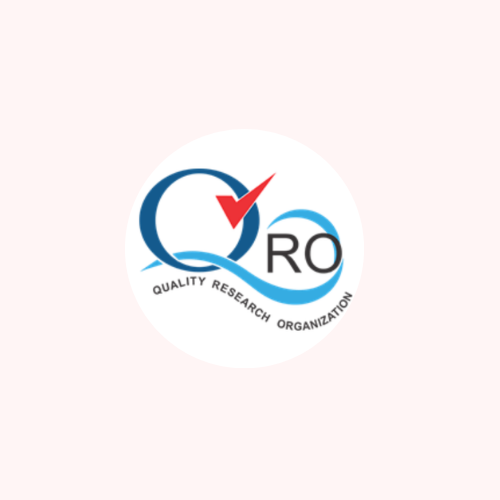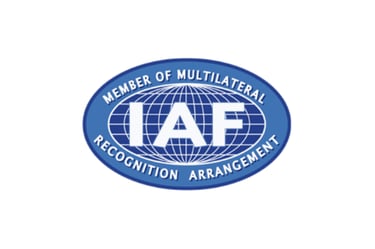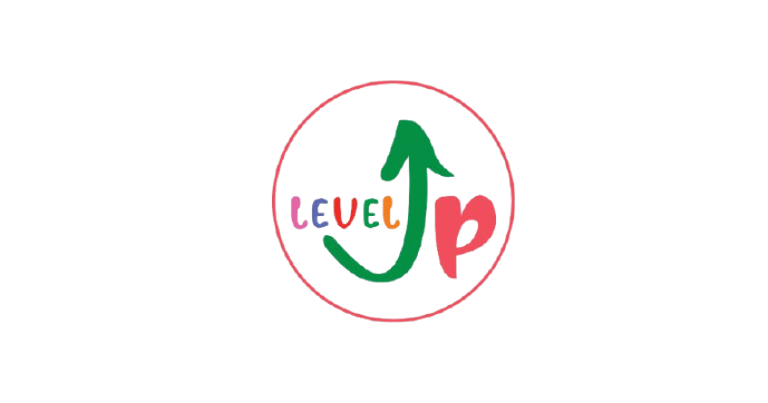Master Child Development & Pedagogy for CTET
Aspirants and teachers: Master Child Development & Pedagogy for CTET (CDP). Get the essential theories (Piaget, Vygotsky) & classroom strategies
CTET
LevelUp Online Education
11/3/20254 min read


Child Development & Pedagogy for CTET is more than just a subject; it’s the heart of effective teaching. For educators working in preschool, ECCE, nursery, or Montessori settings, and for every aspirant preparing for the Central Teacher Eligibility Test (CTET), a deep, human-centered understanding of this topic is the absolute key to success—both in the exam hall and in the classroom. This guide provides a focused, high-value blueprint to help you not just pass, but truly master Child Development & Pedagogy for CTET.
What is CTET and Why It’s Your Golden Opportunity
Understanding the Central Teacher Eligibility Test (CTET)
The CTET is a national-level examination conducted twice a year by the Central Board of Secondary Education (CBSE). It certifies the eligibility of candidates for teaching roles in Central Government schools (like KVs and NVs) and many leading private institutions across India.
Paper I: Qualifies you to teach Classes 1 to 5 (Primary Stage).
Paper II: Qualifies you to teach Classes 6 to 8 (Elementary Stage).
Qualifying the CTET opens up a guaranteed pathway to a stable, respected, and well-paying career. Crucially, the CTET certificate now has a lifetime validity, significantly enhancing your job security and career mobility.
💡 Why Child Development & Pedagogy for CTET is the Most Important Section
The Child Development & Pedagogy for CTET (CDP) section is mandatory in both Paper I and Paper II, carrying a weightage of 30 marks (30 questions).
It’s Foundational: The principles of child psychology and pedagogy are woven into the 'Pedagogy' sub-sections of every other subject (Language I, II, Mathematics, EVS/Science/Social Studies). A strong grip on CDP can indirectly boost your score by another 45–60 marks.
It’s Application-Based: Questions are designed to test your ability to apply concepts in a real classroom scenario. For preschool and nursery teachers, this subject translates directly to your practical expertise.
It Defines Quality Teaching: A high score in Child Development & Pedagogy for CTET is a direct indicator of your competence in creating a child-centered, inclusive, and effective learning environment.
The Core Pillars of Child Development & Pedagogy for CTET
Pillar 1: Understanding the Developing Child (15 Marks Focus)
Principles of Development: Development follows a pattern (Cephalocaudal – head to toe; Proximodistal – center outwards), is continuous, and the rate is individual. Respecting individual pace is key to effective ECCE practice.
Heredity & Environment: Development is the product of interaction ($\text{D} = \text{H} \times \text{E}$). A stimulating environment is necessary for a child's inherent potential to flourish.
Socialization: The crucial role of the immediate environment (family, peers, school) in shaping a child's social and moral identity.
Pillar 2: Inclusive Education & Special Needs (5 Marks Focus)
Inclusion means making the education system flexible for all learners. This is a critical ethical component of Child Development & Pedagogy for CTET.
Diverse Needs: Teachers must bridge gaps for learners from disadvantaged backgrounds using culturally sensitive and relevant pedagogy.
Learning Difficulties: Teachers need to identify signs of SLDs (Dyslexia, Dysgraphia) and respond with differentiated instruction and multi-sensory methods.
Talented Learners: These students require enrichment and acceleration through open-ended problems and creative projects, ensuring their gifts are nurtured.
Pillar 3: Learning and Pedagogy (10 Marks Focus)
This is the application of the principles of Child Development & Pedagogy for CTET in the classroom.
Constructivism: The child is viewed as an active problem-solver and constructor of knowledge. The teacher is a facilitator.
Errors as Diagnostic Tools: A child’s errors are not mistakes, but insights into their current thinking process—a core belief in contemporary pedagogy.
Assessment: Distinguishing between Assessment for Learning (formative, for improvement) and Assessment of Learning (summative, for certification). The entire CTET philosophy is based on Continuous and Comprehensive Evaluation (CCE).
🎯 Deep Dive: Piaget vs. Vygotsky – The Conceptual Difference
Understanding the distinction between these two giants is often the key differentiator in high-scoring papers on Child Development & Pedagogy for CTET. They both belong to the Constructivist school, but their focus differs significantly.
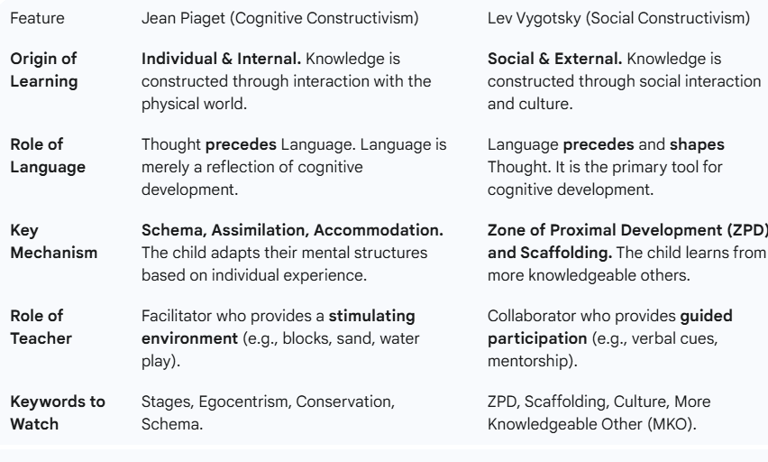

Takeaway for CTET: Piaget tells you what a child can learn at a certain age (stages). Vygotsky tells you how to teach them to reach their potential (ZPD). Both are critical for comprehensive Child Development & Pedagogy for CTET knowledge.
To ensure your preparation for Child Development & Pedagogy for CTET is highly effective, follow this targeted approach:
Contextualize the Theories: Whenever you study a theory (like Kohlberg), immediately apply it to a practical classroom scenario: "How would a teacher respond to a student cheating, based on this theory?" This active application is crucial for the MCQ format of the CTET.
Focus on Application: The exam rarely asks for simple definitions. It asks, "What is the most appropriate pedagogical response?" Your answer must be child-centered, inclusive, and activity-based.
Master Inclusive Terminology: Know the appropriate and sensitive terms for different learning needs. This demonstrates your professional readiness as a teacher and is a consistent scoring area in the Child Development & Pedagogy for CTET section.
Use Past Papers Strategically: Solve previous years' questions not just for practice, but to understand the pattern of errors children make, which is a frequently asked topic in pedagogy.
By approaching the syllabus with a genuine desire to understand the child—not just pass an exam—you will find that the concepts of Child Development & Pedagogy for CTET naturally fall into place. Your professional experience is your greatest asset in conquering this most critical section of the CTET.
🤝 Conclusion and Next Steps
Clearing the CTET exam is a professional milestone, but truly internalizing Child Development & Pedagogy is what makes you an exceptional teacher. The time you dedicate to these principles will not only yield high marks but will transform your daily interactions, enriching the lives of the children in your preschool, nursery, or primary classroom.
Northern Hills Supremus, A-306, opp. Northern Heights, Dahisar East, Mumbai, Maharashtra 400068
LevelUp
admissions@leveluponline.in
© 2025. All rights reserved
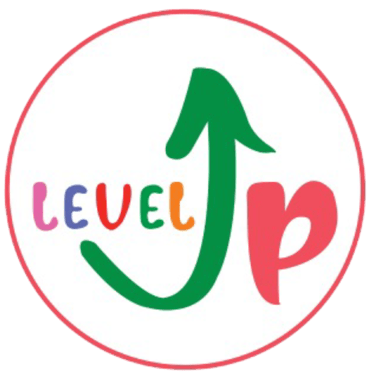

levelup_online_education
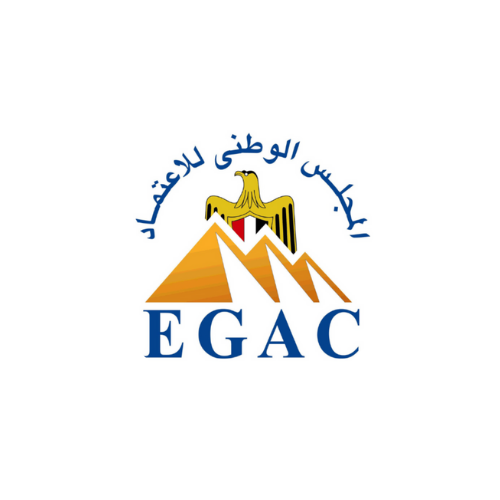

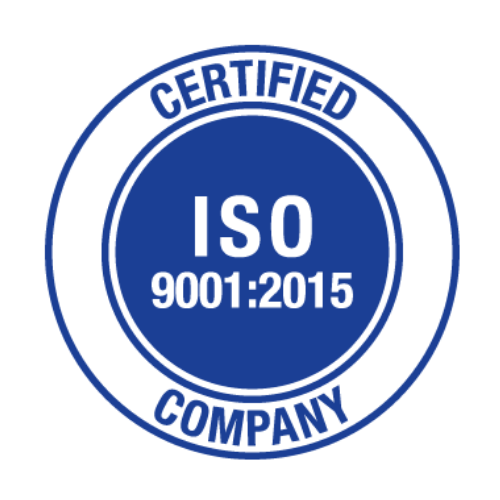

LevelUp Online Education
